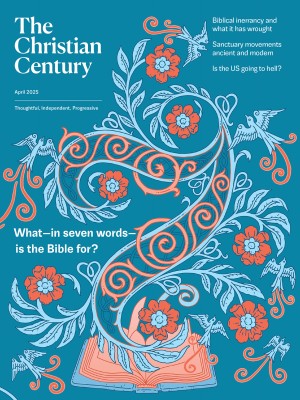Did the mainline church pave the way for Christian nationalism?
Brian Kaylor and Beau Underwood plumb history to show how the Protestant mainline has intertwined church and state interests.

Baptizing America
How Mainline Protestants Helped Build Christian Nationalism
The 2025 inaugural prayer service sparked controversy, particularly around the remarks by Mariann Budde, bishop of the Episcopal Diocese of Washington. Speaking directly to the president, Budde implored, “I ask you to have mercy upon the people in our country who are scared now,” emphasizing the fears of the LGBTQ community and immigrants. This prophetic utterance delighted some Christian progressives, while conservative Christians condemned her words as disrespectful and inappropriate.
Amid the debate over Budde’s remarks, it was easy to overlook the profound religiosity on display at the inauguration. Leaders from various faiths—Jewish, Buddhist, Hindu, Muslim, and Christian—offered prayers and reflections. Most avoided outright political statements, but some invoked divine intervention in the election. Some secularists reported feeling marginalized by these religious overtones.
Read our latest issue or browse back issues.
Brian Kaylor and Beau Underwood’s 2024 book Baptizing America provides valuable insights into this contested landscape. Subtitled How Mainline Protestants Helped Build Christian Nationalism, the book shows how clergy participation in events like the inauguration have fostered a culture of nation worship. Christian nationalism, a “heresy that distorts the gospel and leads Christians away from hearing and following the teachings of Jesus,” builds on the long-standing practices of mainline Protestants.
While this assertion may anger Christians across the political spectrum, Kaylor and Underwood aim to encourage Christian faithfulness and support democracy. Both ordained ministers, they write from a distinctly Christian perspective, seeking to pave the way for a revitalized “mainline social witness” that affords the gospel’s core message a renewed hearing.
In the face of widespread criticism of Christian nationalists, Kaylor and Underwood show that mainline Protestant ministers have historically dominated government-related events—prayer services, congressional invocations, and significant occasions like inaugurations. They contend that mainline Christians laid the groundwork for the intertwining of church and state interests, essentially “baptizing the state.” While evangelical and Pentecostal groups often face backlash for merging divine and national interests, many progressives overlook the historical role that their own branch of Christianity played in creating this possibility.
Mainline Christians may find it challenging to confront Kaylor and Underwood’s assertion that they and their forebears “brought church to state.” The authors contextualize this argument with insightful narratives throughout the book. They draw parallels, for example, between the prayer offered by Jacob Chansley (the so-called QAnon Shaman) during the January 6, 2021, Capitol siege and the prayers of Senate chaplain Barry Black and Presbyterian minister Margaret Kibben. While Chansley’s prayer was overtly partisan, denouncing globalists and traitors, Black’s and Kibben’s prayers are part of the “nation’s official discourse” and are included verbatim in the Congressional Record. Black and Kibben utilized “inclusionary language” that subtly masked their sectarian perspectives, but the authors’ careful reading reveals their sectarian interests.
The book consistently uses this framework—what was presaged by the mainline is continued by today’s Christian nationalists—to explore American religious and political life across time. Kaylor and Underwood offer interpretations of the National Prayer Breakfast, Dwight D. Eisenhower’s presidency, the Pledge of Allegiance, the Iraq War, and several other elements of national history. Each foray reveals how critics of Christian nationalism often inadvertently support the deeper framework.
Kaylor and Underwood also illuminate the irony of how mainline Christians “brought the state to the church.” They recount the incident, during the May 2020 protests following George Floyd’s murder, in which President Trump posed in front of St. John’s Episcopal Church in downtown Washington, DC, holding a Bible. Kaylor and Underwood interpret the gesture as an attempt to align “law and order” with “God’s law.” Bishop Budde—yes, the same one—expressed outrage to an NPR reporter, claiming the president had no right to misuse such a sacred symbol. But Kaylor and Underwood point out that St. John’s, known as “the Church of Presidents,” has designated a specific pew for presidential use. For Trump’s first inauguration, the St. John’s pulpit was turned over to Southern Baptist pastor and Trump supporter Robert Jeffress—a mainline Protestant church provided a platform for a Christian nationalist endorsement of the president.
Baptizing America concludes with recommendations for how Christians can uphold democracy while resisting the allure of power. This includes confronting Christian nationalism by exposing its mainline roots and dismantling the close connections between Christianity and political power. Such entanglements have proven detrimental to both the church and the state. By reaffirming the prophetic messages of the gospel, sharing congregational narratives, removing flags from churches (after thoughtful discussions), and advocating for repentance, Christians can enhance their social witness, strengthen their faith identity, and bolster the health of democracy.
One chapter explores as an area for social witness the provision of sanctuary to undocumented immigrants, which is especially important now that an executive order has granted ICE authority to enter churches for enforcement. The themes presented in this significant book prompt us to reflect on how we might respond to these pressing issues. Reading it prayerfully is earnestly recommended.





